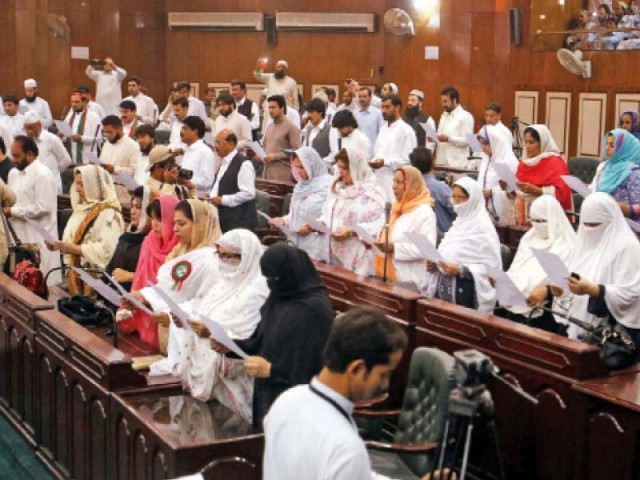
After a short while, however, the session started even though the minimum number of councillors required for the session were not present.
Welcome to the local government setup in Khyber-Pakhtunkhwa (K-P), where most members are unaware of the rules of business.
Legally, a quarter of all members of the house must be present. If a few members are absent, the speaker will give time and will ring the bell till the members come or else the session would be adjourned.
As the speaker waits for councillors to file into the assembly hall, one of the members of the house rose up unannounced much to the surprise of the speaker who needs to approve who is standing to present their view.
“I want the house to make amendments,” he said while pointing to a clause in the K-P Local Government Act, 2013. The councillor, however, was unaware of the fact that such amendments to the LG Act cannot be made by the district council, rather the provincial assembly is the right forum for that.
According to the laws, the three tiers of the local governments in K-P can formulate by-laws but cannot amend the act which governs them. Despite that, the issue of bringing amendments to the local government law comes up every so often in the sessions in violation of the rules of business.
What is bizarre is that it has been nearly two years since the local body elections in K-P in May 2015. But elected representatives continue to display their lack of knowledge and understanding of the rules.
Over 40,000 councillors were voted into the three-tiers local government including districts, towns, tehsils and village, neighbourhood councils.
When asked, a number of LG members were unclear about the difference between the parliamentary terms used in the assembly. “I have not read the LG law,” one of the members of the Peshawar District Council told The Express Tribune who wished not to be named.
“There are a number of technical terms in the law and we do not understand them.” In another session of the district council, a member spoke at length about various issues the public in his union council were facing. In his concluding remarks, he demanded that his speech is converted into a resolution in the house which should then be voted upon by other members. Unbeknownst to him, this demand was against the rules of business of the assembly and that a resolution should first be submitted to the assembly secretariat and then be tabled in the house if approved.
Experts attribute this knowledge gap to a lack of interest by the concerned LG department to train councillors to run affairs of the district councils.
Malik Masood, the programme coordinator at the Centre for Governance and Public Accountability (CGPA) - a non-profitable organisation working for transparency and governance in K-P told The Express Tribune that the issue of training had surfaced since the elections were held. He, however, was reluctant to blame the councillors for their learning about the rules of businesses noting that most were new to the local government setup and needed to be told what the proper way was.
“The members are more interested in funds rather than focusing on legislative matters of the council,” Masood said as he pointed to the recent amendments made to the local government law by the K-P government which authorises the provincial government to use a certain portion of the district Annual development programme.
Published in The Express Tribune, May 1st, 2017.











COMMENTS
Comments are moderated and generally will be posted if they are on-topic and not abusive.
For more information, please see our Comments FAQ